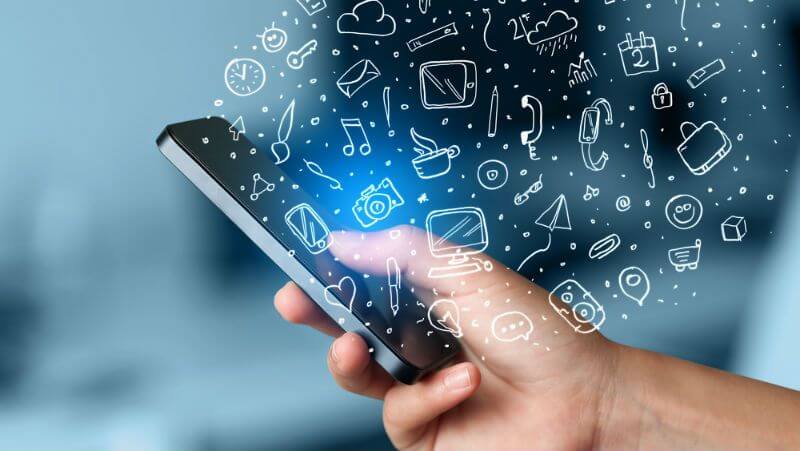Smartphones have radically changed people’s lives. Before people have to take extra effort in sending messages or buying a camera just to take pictures. Today, these functionalities are integrated into one, rectangular – revolutionary technology that keeps getting smarter and smarter every day. Since then, smartphones are never found out of reach to people.
According to statistics, almost half of the population owns a smartphone. In a 2016 survey conducted by the Bank of America, 96% of the millennials aged 18 to 24 years old said that smartphones are very important for them. 93% of them even stated that smartphones are more important than deodorants and toothbrushes. The survey also found that an individual checks his or her smartphone every 6.5 minutes.
Everything has its advantages and disadvantages. In the section, let us know how we can benefit from smartphones and at the same time, what the disadvantages of smartphone technology are:
8 Advantages of Having Smartphones:
Instant Communication
Smartphones evolved from the earliest communication devices. Thus, it has been created to primarily improve people’s way of communicating with each other. The advent of smartphone technology modernized communications. It has paved the way for SMS, text messaging, calls, video chat, and apps that allow people to instantly communicate with everyone across the globe.
Web Surfing
Smartphones also make it convenient for people to surf the web. These devices are integrated with mobile browsers that enable them to research and access websites anytime and anywhere. According to a study, 10% of the total time spent by people on smartphones is used in opening browsers to surf the internet. With this, people have easy access to information.
Camera
In this “selfie” generation, the camera is so important. It saves people from buying a separate digital camera to take photos and videos. Especially now that the millennials are fond of posting photos on social media. According to a 2014 Comtech study, the camera ranked third as the most important consideration for consumers in buying a smartphone. With this, smartphone giants make sure their phones are equipped with the best camera.
Entertainment
Smartphones are also viewed as a source of entertainment – games, music, movies, and books. Based on the 2016 statistics, there are more than 63.7 million people in North America use smartphones for gaming. Moreover, users can listen to their favorite music with iTunes and Spotify, among others. Watching movies and reading e-books are also convenient through smartphones.
Education
Smartphones also aid education, especially in children. With easy access to information and helpful content, children can have more interactive learning through watching education videos and playing education applications. They can also easily surf the internet if they want to search for something about a topic.
Productivity Apps
Smartphones can do almost everything with the help of apps. There are over 2 million apps in Google Play Store while over 1.5 million apps in Apple App Store. People spend 90% of their time accessing apps with which an average user installs 36 apps on their smartphone. The functionality of apps varies from each other – photo and video editor, ticket booking, online store, payment system, data analysis, personal assistant, etc.
GPS
Most smartphones now are equipped with Global Positioning System (GPS). This technology allows people to locate certain addresses and areas all around the world. This helped improved not just communication, but most especially, transportation.
Privacy
With smartphones, you can do whatever you want without anyone knowing it. You can snap photos of yourself and secure your photo library with a password. You can also send messages to your loved ones without the fear of anyone knowing it. Online transactions can also be done through smartphones.
8 Disadvantages of Having Smartphones:
Costly
Smartphones can be expensive, especially those high-end phones with great specs and features. Apart from the smartphone itself, some applications require being purchased to fully use the other functionalities offered by the app. If you also want data connectivity, you need to maintain a data plan.
Poor Social Interaction
Based on the new data released by analytics firm Flurry, people use smartphones at least 5 hours a day. They also added that people’s usage of apps increases to 69% last 2017. With this, the “real” social interaction degrades. People no longer interact with people outside as they tend to spend more time with their smartphones.
Distraction
Despite the productivity, smartphones can be distracting. Applications notify you when there are messages, updates, latest offerings, etc. These interrupt the momentum which can potentially affect your productivity. When you attend to these notifications, you’ll find yourself attached to the phone.
Health Issues
Smartphones are also found to hurt your health. Smartphones emit radiofrequency energy which can be absorbed by the tissues in the body. Sleep deprivation is also one of the common bad effects of using smartphones. Moreover, phones produce HEV light which can damage your eyes’ retina.
Addiction
When you wake up in the morning, do you find yourself checking your phone first more than anything else? If you do, this is an early sign of smartphone addiction. This problem may lead to a serious addiction. This may include addiction to games, social media, etc.
Privacy Threats
Even if smartphones are made private, there are still security risks and threats everywhere. Hackers are always present and virtual viruses are potent. Smartphones are vulnerable to these threats when you access the internet. Thus, you need to be extra cautious of opening sites and links.
Extra Work
With a high-end smartphone comes…extra work. Smartphones are widely used in business. If you find yourself relying on various apps, then you are working on extra workloads which are not even existed before. Moreover, your boss can instantly call you even in the middle of the night.
Uncensored Content
Lastly, there is a disadvantage in easy access to information and the internet. People, especially children can see, intentionally or not, the uncensored content including violence, pornographic content, etc. If you have children, make sure you regulate their use of smartphones.



